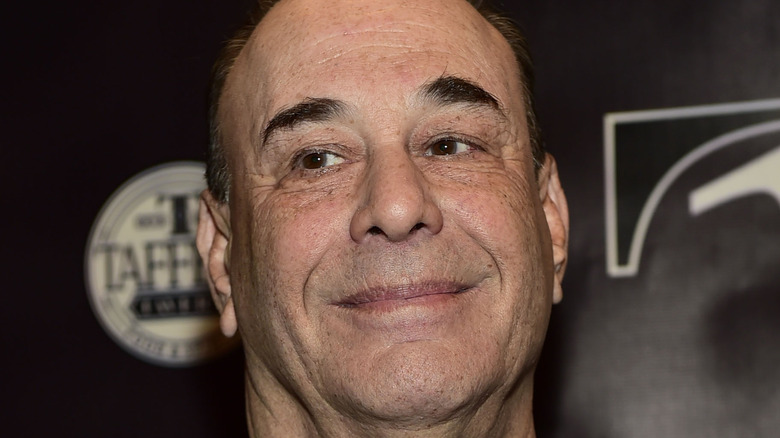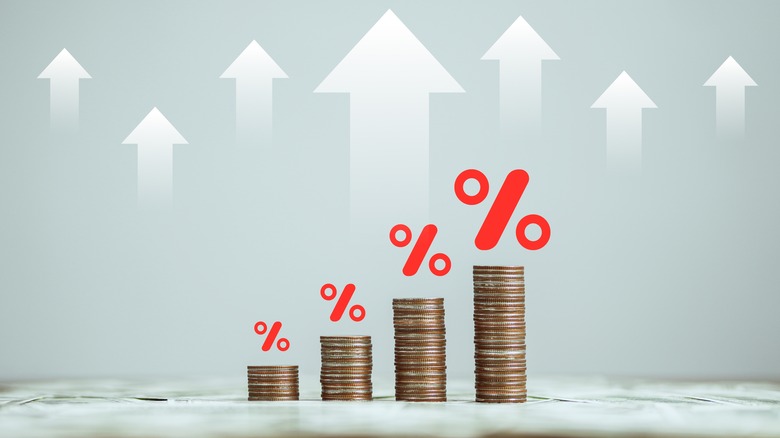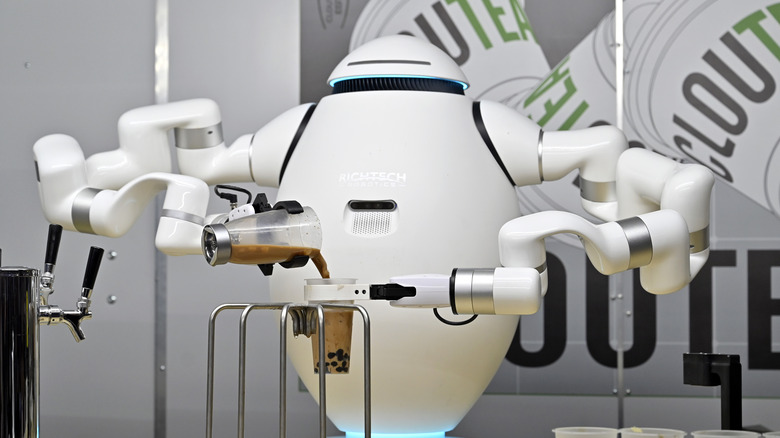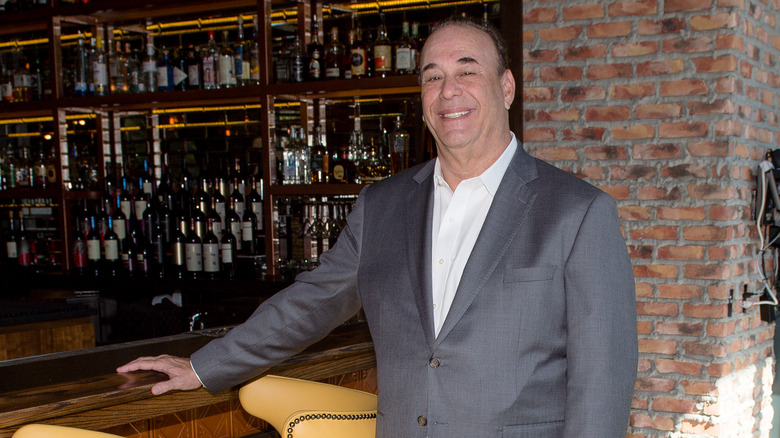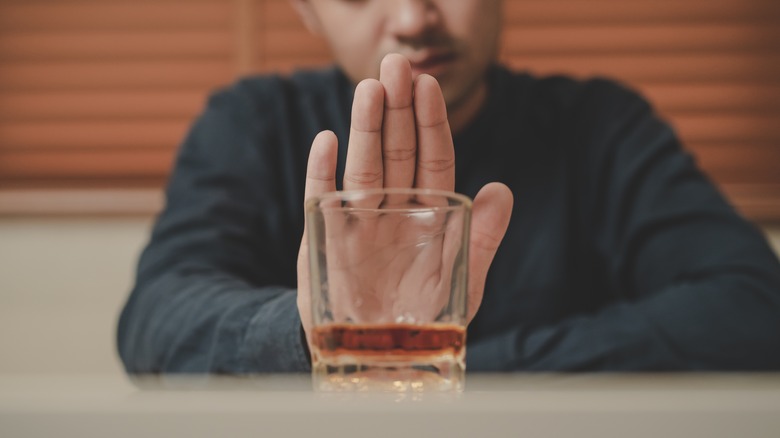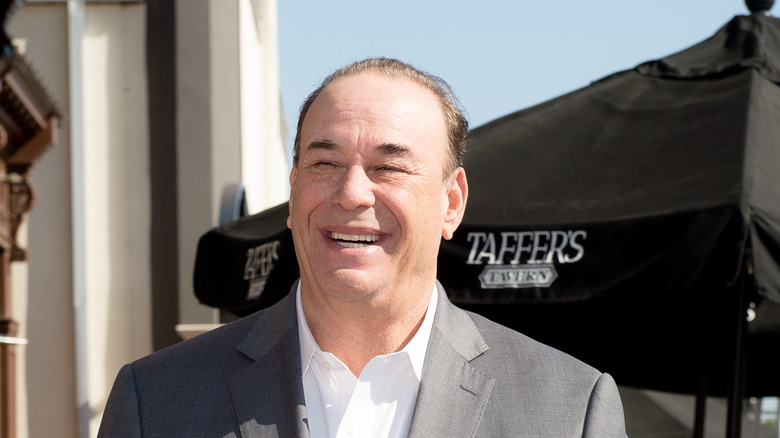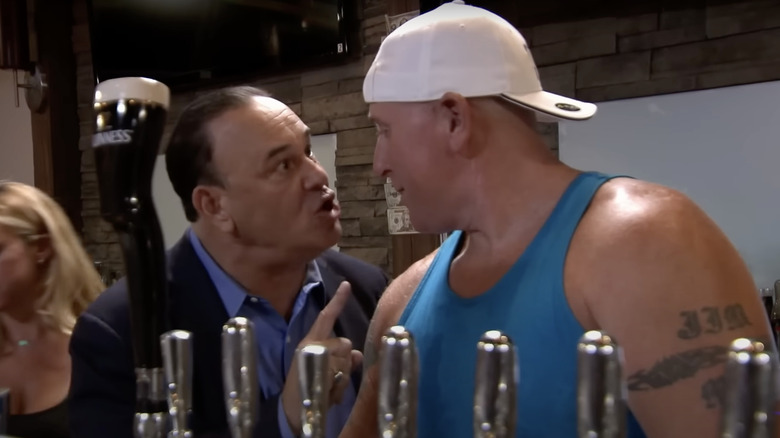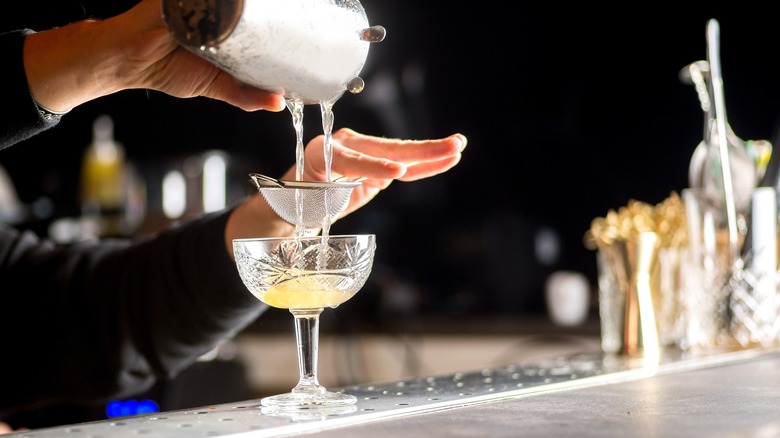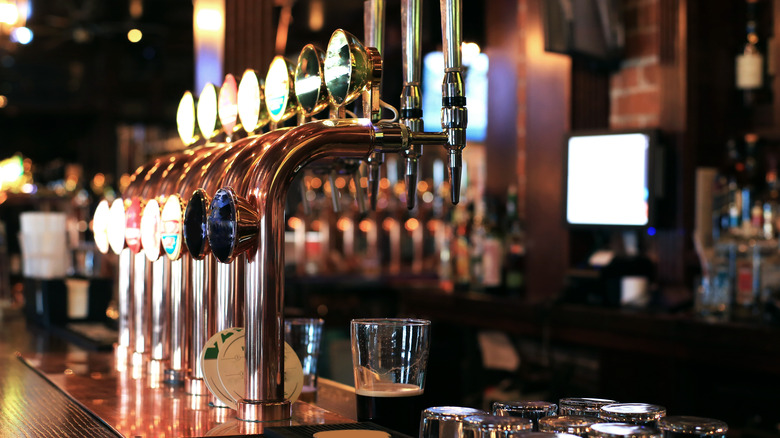Jon Taffer Opens Up About The Future Of Bar Rescue - Exclusive Interview
Since 2011, bar and hospitality consultant Jon Taffer has been using his television show to strike terror into the hearts of underperforming bar owners across the U.S. His methods can sometimes seem aggressive, but he's not trying to be mean; instead, the mission of his show, "Bar Rescue," is to save bars on the brink of insolvency and turn them into profitable businesses. Over the years, Taffer has rescued innumerable bars, often preventing family-owned businesses from falling into deep financial holes.
Taffer spoke with Mashed about the continuation of Season 8 of his show, which deals with a bar scene transformed by the lingering effects of the pandemic and rampant inflation. However, it's not all bad news; innovative technology is transforming the hospitality business in exciting ways. In the interview, Taffer expounded on why he's so excited about both the future of his show and the future of the industry he's worked in for decades. If you want to know what the average bar is going to look like in a decade, keep on reading to see Taffer's expert predictions.
How inflation and the pandemic have challenged bars
Inflation is all over the news. Has that been hitting bars hard?
It has, for sure. Chicken was up over 20%. Beef is up. Yes, all of our products are more expensive. But this one will really get you: You know those little ketchup packets that you get? For a while, those were 30 cents each, if you could get them. So these costs are killing us. They inch up.
When these external things that you can't control are working against you, like inflation, not being able to find enough employees, the remnants of COVID ... When these outside things are working against us, we have to do a much better job with the things we can control. So experience matters more than ever before.
The pandemic has been mostly a challenge for bar owners, but do you see any opportunities coming from this kind of adversity?
I do. It's interesting — I was at a restaurant convention the other day, and about five years ago, there were three robotic booths at this major restaurant convention. Today, there are about 120 robotic booths at the restaurant convention. It's amazing to watch what an industry does: When we can't find people, we have to invent machines or something to replace that person because the function still has to happen.
I've watched the industry try to solve these problems the past couple years. There's all-new equipment for sanitation that keeps surfaces clean, and kitchens are cleaner than ever as a result of COVID, safer than ever. When I look at employee sanitation, they're washing their hands and doing better than ever. I look at the training that we give to employees now. Because of COVID and sanitation, it's better than ever. There's a lot of things that have elevated our industry as a result of going through something so difficult.
Why robots are the future of hospitality
Do you think that robotics and automation are the future of the industry?
I do. It was incredible to see the burger makers, the pizza machines. I saw a vending machine that produces a delicious pizza you can put on any corner, and it's fresh-baked, it's not frozen, and it's untouched by human hands. When you look at the grilling systems, the cooking systems, the robotic arms that move and turn and drop and flip, it's a remarkable time in the industry.
I own Taffer's Tavern, which is my own restaurant franchise, and I've resisted those things because I really want my restaurants to have that human factor. ... I like when people look in each other's eyes and connect and communicate that way. ... You're not going to get connectivity out of a tablet.
So in Taffer's Tavern, we put all the technology in the back of the house, not in the front of the house, so we've kept that human element and that connectivity in the front of the house. But sure, we use all the new technologies in the back of the house because, again, it's hard to find employees, so we've made it more efficient. If there's a place you go to and there's a server or bartender or somebody that you connect with, you're going to go back there, and I don't like when we lose that human factor in restaurants and bars.
What's different in the new episodes of Bar Rescue
Moving on to the show, you've been doing this for over 10 years now. How is doing the show different now than when you started?
It's much more free for me now. I have a great network, and there's no network executives on my show like there normally are on shows. I have the freedom to follow the story. And if you watch the show a lot, you'll see I deviate from the standard format sometimes. If the story is about you and your brother, or if it's about you and a business partner or whatever it may be, I want to tell that story. What we've learned over the years is to follow the story, even if you deviate from the format, because, sure, the pictures of the new bar are cool, but again, it's no different from any restaurant: Humanity is what you connect with.
The show is sort of Shakespearean, if you think about it. Person in trouble is Act 1; resist change is Act 2; starts to transform is Act 3; redeems themselves is Act 4; happy ending is Act 5. It's like Shakespeare in a way.
What are you most excited about [in these] new [episodes]?
Last year, I had to be pretty gentle because of COVID. COVID was a valid excuse last year. How do you hold somebody accountable when we're in the middle of the pandemic? So I was easy on them.
Now, I have an opposite approach because we can't control inflation, we can't control labor. We have to make the things that we can control better, so if we're going to succeed, the pressure's on. I got to hire right. I got to train right. I got to manage this. You're going to see the old, aggressive Taffer back, [the] post-COVID, aggressive Taffer back, because the excuses are gone now. It's time for them to step up.
Why drunk bar owners are a no-no
In the episode [I saw], you had to be really tough on the owner to convince him to stop drinking at work, and you mentioned that you learned a long time ago that that's a terrible idea. What led you to that conclusion?
I've learned over the years that I've never seen a drunk bar owner be successful. I've never seen it in the hundreds and hundreds of bars that I've been in. Successful bar owners are sharp, they have energy, they're walking fast, they're moving fast, they're shaking hands, they're looking in people's eyes, they're engaged.
I came up in a bar business. When I was a manager of a bar, I never drank. I said to myself, "Somebody's got to be sober. Somebody has to be responsible for the people in this room." If somebody slips and falls, God forbid ... Somebody could have a heart attack. Somebody's got to be sober and responsible for the people in that room. So I get very angry when an owner is intoxicated. He's putting his customers at risk, his business at risk, and in the case of that episode, his family at risk.
The challenges of helping family businesses
Speaking of family, are there unique challenges when you go into a family-run place?
Very much so. I tell families, if it was a baseball team and little Johnny couldn't hit the ball, they'd bench him. He wouldn't be playing anymore. But if it was a family, everybody would pat little Johnny on the back and they'd say, "Ah, little Johnny tried."
In businesses, we don't placate failure. We don't let people get comfortable in failure. [In] families, we do that. When you have a failure, your parents should make you feel good about it, but your boss shouldn't. Your boss should hold you accountable. So I always say to a family, "Be a family outside the bar. In the bar, be a team." Hold each other accountable, just as you would a non-family member.
Do you ever feel like you're a therapist or family counselor?
Funny that you say that, because there are episodes where my crew calls me Dr. Jon. There are times when I feel like I'm saying things to somebody that haven't been said before, or I'm connecting, I'm getting through, I'm changing the way they think. It's amazing because you can see it in their face when it happens.
So yeah, sometimes I get that feeling, and it's an amazing feeling. "Bar Rescue" is this platform where people come in weeks ahead of time or days ahead of time, and they put in cameras and sound, and I show up, and it's fake — there's lights and there's cameras and there's microphones — but the reality that happens in that artificial envelope is remarkable.
In real life, if I walked into your business and said the things I said to owners on the show, you'd throw me out. But in "Bar Rescue," they don't. Every word, every person is [real], but the environment, the envelope that it's in, gives me the liberty to push you farther, challenge you more, and achieve greater things from you than the normal environment would have. That's a blessing to be able to do that for people and help people in that way. How freaking cool is that?
Do you find it's more rewarding when it's a family that you're helping out?
Very much so. I love families. I love family episodes. I love it when there's a mom and a kid and a father and the business is destroying their family, which is horrible. I realize, if I can correct the financial situation of the business, I can change the entire dynamic of this family. And we do, and man, does that feel good!
How to change a stubborn bar owner's mind
How do you choose the people that you send in to do recon? The episode I saw [had] Maria Menounos and her husband, and I know they've done it a few times.
Well, Maria's a dear friend of mine. She's one of my best friends, so I asked [Maria and Kevin] to do it for me years ago as friends. Now, she's done three or four times. ... I try to bring her back once every year or two so she remembers what terrible food, terrible drinks, and a dirty environment smells like.
Do you have any secret formula for motivating stubborn owners, or is every case different?
Every case is different, and you'll see there is a method to my madness. I don't get angry as much as I get loud, deliberately, to make a point. Even though people might think I'm angry at the moment, I'm not. I'm acting angry to crack through to this person who's being resistant, and sometimes raising my voice and creating a moment can crack through.
When somebody's stuck, first, I'll appeal to their pride. If that doesn't work, I'll make them scared of failure. "What are you going to do when you lose your house? What are you going to do when you lose your cars? What are you going to do when your wife or your husband leaves you?" If I can't get the pride to work and I can't get the fear to work, then I start to do things like showing them pictures of their children.
These are all tools that I have in my toolbox, core tricks that allow me to find out which button is going to work for this person. Sometimes it's their kids that kick them in gear; other times, it's their wife, or other times, they just need a good kick in the butt and a reality check. I look for all those things and try to find out which is going to motivate [them], which is going to change their behavior.
Jon Taffer's strategies for bar makeovers
What's your strategy for picking out a new theme and look for the bars?
I've been doing this for a long, long time, so I can't tell you there's a strategy. When I get to the bar, I've never seen it once before. What people don't know is when recon stops and the cameras are turned off, I take all the employees and the owners, we put them in vans in the parking lot, and I go in and design the bar that night.
I've never been there before. Recon is over. We're going to start building it in two days. We don't have a lot of time. I'm given a sheet that I've designed with my team that gives me demographics, competitive information, male-female mix, married [or] not married, all that type of data so I can get a snapshot of the marketplace. Then I look at the competition, look at the building. If the ceilings are really low, it's not going to work for a sports bar. You can't put TVs in it. If the ceilings are really high, it might.
Sometimes it's looking at the physical assets of the building that I have, vertically and horizontally. Other times it's strictly market-driven. But it's done on the spot. It's not like there's much of a strategy. It's much more of a gut call from looking at the information around me.
... I don't choose the bars. I don't look at the casting reels ahead of time. I've never met these people before. That's why I think the show's successful: I've kept it real. People aren't stupid. They know fake.
Tips for choosing perfect bar employees
What qualities do you look for in bar employees?
The first one is, I don't care about their resume. I don't care if they've worked in a bar before or not. To me, bars are all about that connectivity. I want dynamic employees who walk to the beat of the music, cheer when a point is made or a score is made, look in your eyes, connect with you, talk with you. That's what I love. Those are the best employees of all. You give me an employee with a personality like that, and I'll give you a great server, a great bartender in no time.
Is it challenging when you're going into a bar that you're rescuing and these employees aren't people you necessarily would've hired yourself?
Sure, it's frustrating, but they're not making any money. They're in a failing bar. What great employee is going to work in a failing bar? So I don't expect a failed bar to be filled with superstars. I sort of expect [less-than-great employees], but as the bar gets a better reputation, then they'll start to get better employees, and that's how you evolve yourself out of that.
What bars will look like in a decade
Where do you see the bar industry going in 10 years?
I'm going to start by saying the second public building built in America was a bar. The first was a church. The first distiller in America was George Washington. One of the first vintners in America was Thomas Jefferson. Bars back then were called public houses, and the ministers went, and the priests went, and the farmers went, and the mechanics went, and the longshoreman went, and they were the centers of the communities. That's where business deals were done. That's where marriages took place. That's where friends emerged and new friendships became realities.
That connective fiber of what a bar means to America I don't believe is going to change. I believe there'll always be a place for that neighborhood bar, that neighborhood public house, that place where people go two or three times a month and see friends and enjoy that environment.
I see the bar industry becoming, in a sense, colder and more intimate at the same time. New bars with kiosks and all these things are going to get colder. They're not going to be as intimate, as personal. And then you're going to see things like the dive bars that are woody and dark and intimate and a little sexy. You're going to see those start to emerge because the connectivity is not going to be to a tablet; it's going to be to a person. The future of the bar industry is still all about people.
What to look for to tell if a bar is going to be bad
In your life, how do you evaluate whether a bar or restaurant is worth going to?
It's funny — I can do that in the first three steps in. First of all, we'll get to the front door. If the front door isn't clean, don't go in. If they can't keep the first thing you see together, then nothing else is good. Next, when you walk in, what do you smell? What do you hear? What do you see? What you hear will tell you if the place is for you or not, musically, et cetera. If it's headbanger music ... If it's country and Western, it could be [or] it could not be. What does it sound like?
But the thing that gets me at every bar and restaurant is, rub the side of the salt and pepper shakers on the table. If they're greasy, don't eat there. When they clean those every night, then they're cleaning the tables, they're cleaning the environment. Little things like that matter.
New episodes of "Bar Rescue" debut on Paramount Network and Paramount+ on Sundays beginning February 26. You can also visit Taffer's Tavern locations in Georgia, Massachusetts, and D.C.
This interview has been edited for clarity.
